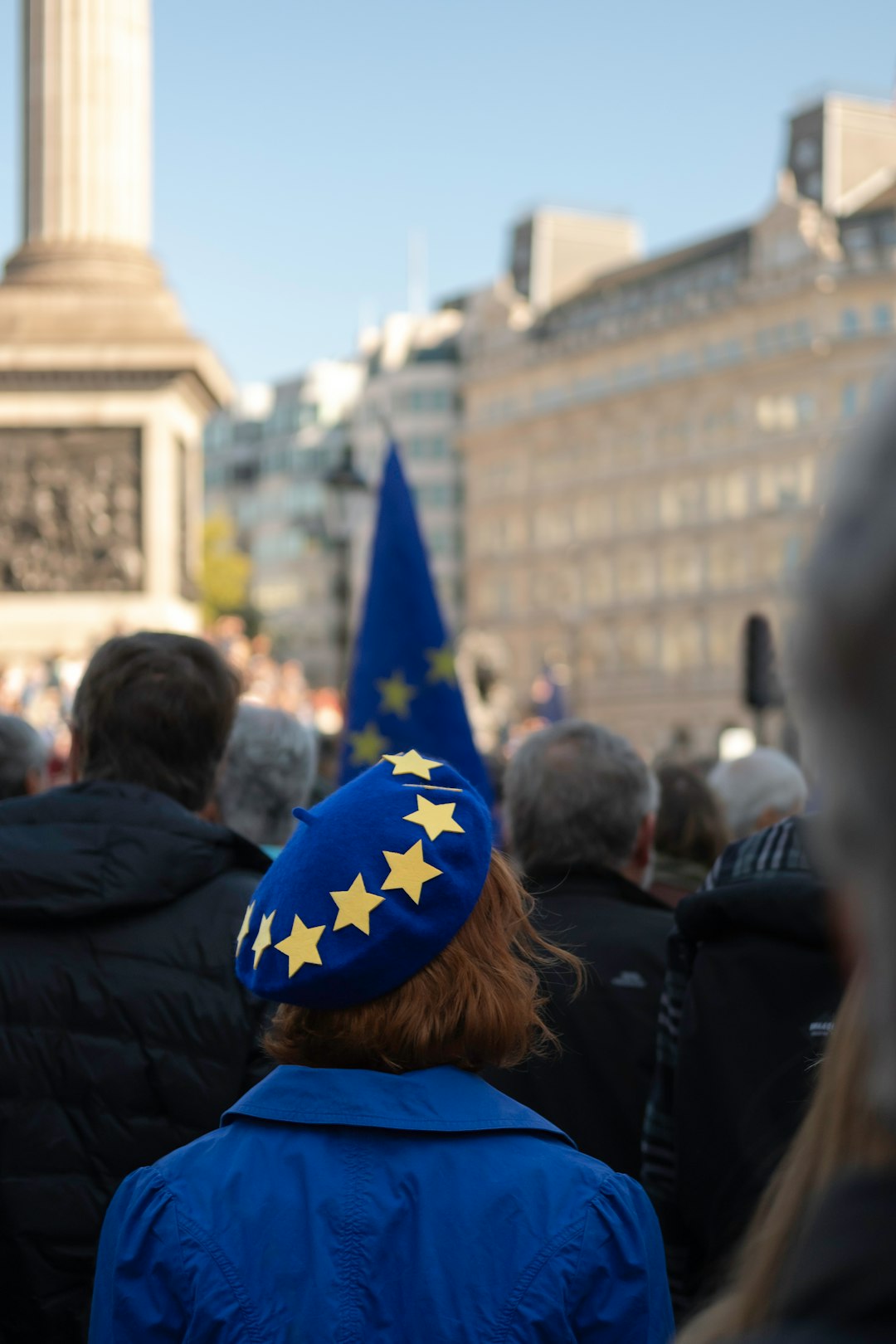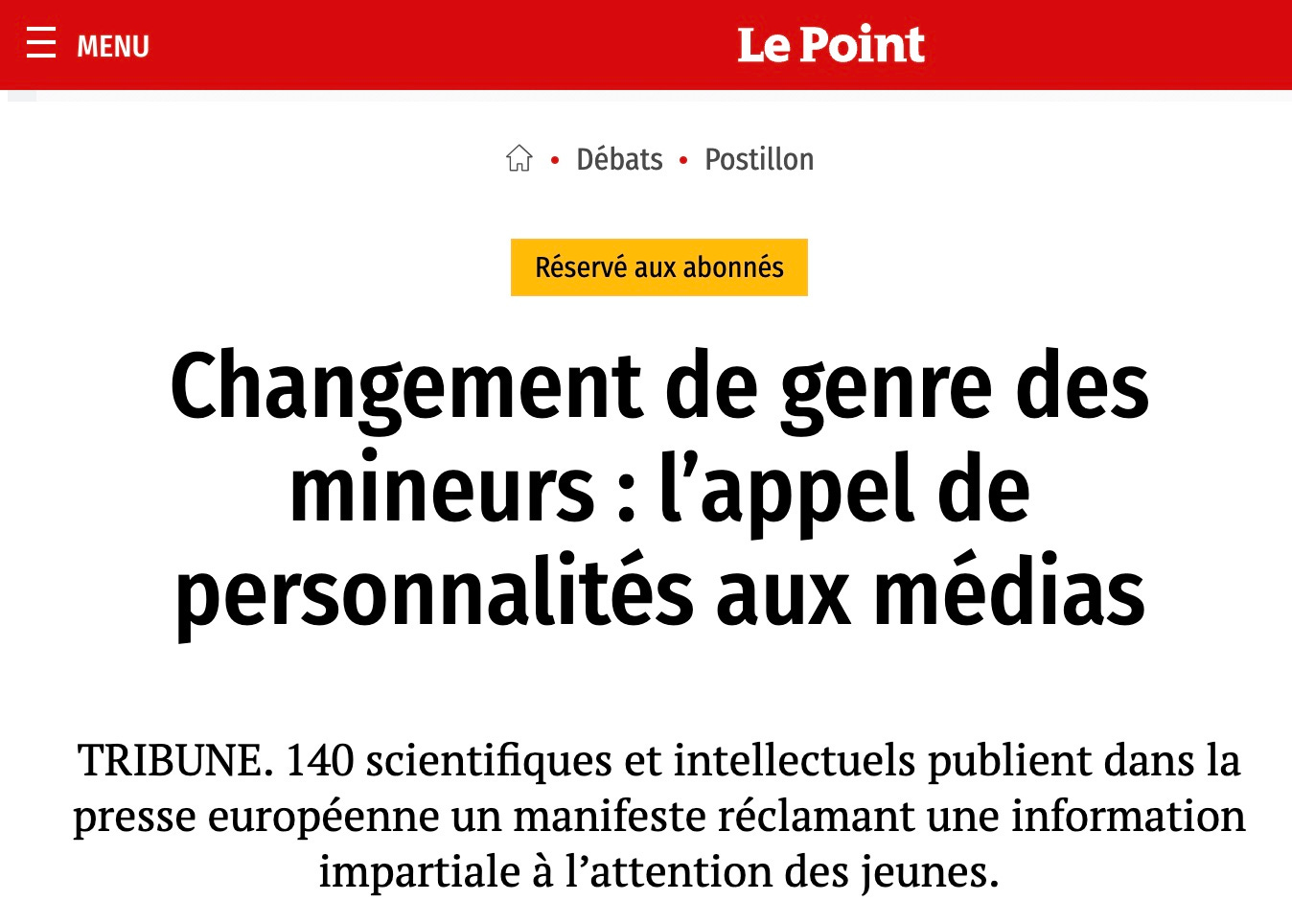'Tell the truth'
A pan-European petition calls for accurate media coverage of youth gender medicine

A fast-growing European petition is warning the public that they are being denied the truth about medicalised gender change for minors.
“Too many [media] programs and reports [simply] convey the unfounded claims of trans-affirmative activists,” the petition says.
“Children and teenagers are displayed on TV together with their parents in order to support the unsubstantiated claim as to the benefits of sexual reassignment.”
The petition was launched on July 7 with 140 signatories including clinicians, scientists, feminists, academics and other professionals from France, Germany, Belgium, the United Kingdom, Switzerland, Sweden, Norway and Finland.
The total quickly rose to more than 7,000 signatures in less than a week. The petition is open to all Europeans who share the same cautious approach to youth gender issues, “while respecting the rights of transgender persons”.
It represents a new level of international co-operation among health professionals and others alarmed by the unexplained spike in teenagers, disproportionately girls, declaring a transgender identity and seeking irreversible medical intervention.
Published in the newspapers Le Point (France), Bild (Germany) and Le Soir (Belgium), the tri-lingual petition calls for media organisations to guarantee impartial reporting and viewpoint diversity on the topic of gender medicine for minors.
On the website of Le Point, a top-ranked reader’s comment said: “This is the medical scandal of the 21st century. Finally, members of the scientific and medical world are taking a clear stand against this experiment on children!”
The new European petition says that medical transition with hormonal and surgical interventions is promoted in the media as “a miracle solution to the problems of adolescence”.
“Medicalised ‘solutions’ to these young people’s problems are growing rapidly while the number of [regretful] young people detransitioning continues to grow.
“[Detransitioners] have been seriously physically damaged by their ‘transition’, and they testify to the superficiality with which they have been treated by doctors, psychiatrists and other health professionals.”
The petition says that critical experts with “real knowledge” of youth gender dysphoria — and the self-correcting nature of this distress for most young people as they mature — are excluded from media debates, while the realities of medicalisation are evaded with “soothing language”.
“We are witnessing the promulgation of a new vocabulary that has been created specifically to serve the function of clothing opinion with spurious scientific credibility. This is causing considerable confusion to young people.”
The petition project involves the Franco-Belgian watchdog organisation The Little Mermaid, which last year raised the alarm about gender ideology and “the kidnapping of childhood” in an opinion article in the French news magazine L’Express.
Psychiatrist Dr Sylvie Zucca, a member of the board of The Little Mermaid, told GCN that the general reaction to the July 7 petition had been positive and enthusiastic, with people relieved to see open discussion of this hot-button topic.
She said there was the usual abuse online and cries of “transphobia” from activists who refused to acknowledge that the petition was focussed only on greater caution for children and adolescents.
“We are also accused of being extreme right-wing,” she said, but pointed out that The Little Mermaid is apolitical as a group with most of its members drawn from the medical and psychological field of early childhood and adolescence.
The petition draws a link between the medicalisation of gender non-conforming youth; the trend in rich countries to allow easy, self-declared gender change in official records; and gender ideology in mainstream media, social networks and in confusing, age-inappropriate “sex education” material from primary school onwards.
“As scientists, childcare professionals and academics, we strongly disagree with the assertion that women and men are merely social constructs or perceived identities,” the petition says.
“We do not choose our sex. One is born a girl or a boy. One's sex is established [not arbitrarily ‘assigned’] at birth and registered, and each person constructs an identity that is never fixed and that evolves over time, something which is too often ignored.
“One can change the appearance of one's body but never its chromosomal basis.”
A waiting game
In France, those hoping for more caution in youth gender medicine are awaiting developments at the French National Authority for Health (la Haute Autorité de Santé or la HAS).
This state agency is charged with updating a 2009 medico-legal guideline entitled “The medical care of transsexualism”.
It’s thought la HAS might be influenced by March’s bombshell statement from the French National Academy of Medicine, which stressed the grave risks of medicalised gender change for minors.
The Little Mermaid’s Dr Zucca told GCN that the policy outlook might be clearer by the northern hemisphere’s autumn.
“Since we contacted the academy of medicine — which is starting to take action, although we have no further details — we have also contacted the authority for health [la Hass], which is in the process of setting up study groups,” she said.
“We do not have any national figures on medical transitions carried out on minors in France to date — real, in-depth journalistic work is needed on this subject.”
She hoped that debate would open up among the general public, in schools, workplaces and the health system, and that trans activist rhetoric would have less influence.
“Just now, it is the same double discourse from trans activists,” she said.
“First, guilt-tripping around the notions of stigmatisation, victim discrimination, transphobia and risk of suicide.
“Second, intimidation via the use of the law and threats, and shattered reputations via Twitter and other social networks.
“It is a language that allows no debate, no dialectic — ‘You are with me or you are transphobic’.
“It is a language that is also very confusing because it is constantly changing — for example, gender dysphoria which became trans identity, and may now become gender incongruence.
“We understand that public institutions fight again discrimination — and we are on the same side.
“What we want is freedom to ask questions about a rush to medicalisation with children who definitely aren’t all trans.”
On saying ‘no’
Among the first 140 signatories was Nadia Geerts from Belgium, a lecturer in philosophy, writer and activist for secularism. She told GCN why she felt moved to add her name to the pan-European petition.
“As a secular humanist, I am very attached to the idea that man is not only an animal, since what characterises him is precisely that he has managed to emancipate himself, to a certain extent, from his animal condition,” she said.
“I therefore have no problem with the fact that an adult man or woman wishes to transform his or her physical appearance to be more in line with what he or she feels to be.
“On the other hand, I am concerned about the trivialisation of gender/sex change (we are on the borderline between the two here, since changes are sometimes made via hormones or surgery) among young adolescents, whose words and feelings are considered to be somehow the law.
“This overlooks the fact that the bodily changes that occur at puberty have always been difficult to live with, especially for girls.
“It seems to me that the haste of certain parents, doctors and therapists to not only hear but above all to resolve the discomfort of these young people by sometimes irreversible interventions is worrying, a sign of an inability to say ‘no’, to postpone the response to a request, [when this would be] in the very interest of the child or adolescent [who] by definition is still in development, in search — with all the doubts that this implies.
“Moreover, I think that if man can emancipate himself from nature, this cannot amount to denying it — an individual born male or female will never be able to change sex completely, since sex is genetically coded.
“I therefore consider that today we are confronted with a discourse that is very ideologically marked, and in many respects dogmatic. Science does not tell us everything about humans, but neither does sociology, psychology or any other discipline.”
Stuck in the wrong narrative
On June 30, Germany’s ruling coalition announced key elements of its plan to allow a person’s officially recorded birth sex to be changed with a simple declaration; children would be able to do this from the age of 14.
Psychiatrist Alexander Korte, one of the first signatories to the July 7 European petition and an expert on youth gender dysphoria, explained to GCN why he sees a link between self-declared gender change in law and medicalisation of young people.
“I am firmly convinced that young people who have undergone legal transition at an early stage feel confirmed in their narrative of ‘living in the wrong body’ and thus run the risk of seeing the transsexual [medicalised] path as the only option for them,” Dr Korte said.
“If a young person is officially confirmed ‘with letter and seal’ — unchecked, by a purely administrative act — that he or she is trans, then it is obvious that he or she will feel prompted to now also have bodily medical measures carried out on him or her.”
In his evidence to a committee of Germany’s parliament, Dr Korte pointed out that a child’s self-diagnosis as “trans” could turn out to be “a subjective misjudgment”.
The possibility of realising this mistake “presupposes that the child is granted developmental space and time,” he said.
“But is it realistic to assume that children, in the case of an early [legal] transition in terms of personal status, carried out at a young age, are able to fight against the facts created by this? — to later reverse the legal decision made with all its consequences and to take another, alternative path?
“Or is there not rather a risk of prejudging the persistence of gender dysphoria to [medicalised] transsexuality as the only option for the child with an unchecked change of civil status carried out in the form of an administrative act?”.






Good to see scientists, health professionals and others coming out of the closet to defend reality, sanity and the ancient ethical principles of medicine, such as Duty of Care and Do No Harm. Hopefully this courage and solidarity will spread to scientists, clinicians and therapists in other countries--and perhaps eventually to those in Australia. Any concerned health professionals (like me) interested in building solidarity around these issues, and around the need for a more cautious approach, particularly when treating minors, please feel free to contact me here: https://www.facebook.com/WatchfulWaitingOz